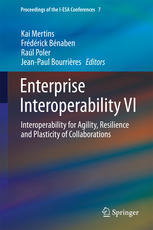

Most ebook files are in PDF format, so you can easily read them using various software such as Foxit Reader or directly on the Google Chrome browser.
Some ebook files are released by publishers in other formats such as .awz, .mobi, .epub, .fb2, etc. You may need to install specific software to read these formats on mobile/PC, such as Calibre.
Please read the tutorial at this link: https://ebookbell.com/faq
We offer FREE conversion to the popular formats you request; however, this may take some time. Therefore, right after payment, please email us, and we will try to provide the service as quickly as possible.
For some exceptional file formats or broken links (if any), please refrain from opening any disputes. Instead, email us first, and we will try to assist within a maximum of 6 hours.
EbookBell Team

5.0
58 reviewsIn 2007 INTEROP-VLab defined Enterprise Interoperability as “the ability of an enterprise system or application to interact with others at a low cost with a flexible approach”. Enterprise Interoperability VI brings together a peer reviewed selection of over 40 papers, ranging from academic research through case studies to industrial and administrative experience of interoperability. It shows how, in a scenario of globalised markets, the capacity to cooperate with other firms efficiently becomes essential in order to remain in the market in an economically, socially and environmentally cost-effective manner, and that the most innovative enterprises are beginning to redesign their business model to become interoperable. This goal of interoperability is vital, not only from the perspective of the individual enterprise but also in the new business structures that are now emerging, such as supply chains, virtual enterprises, interconnected organisations or extended enterprises, as well as in mergers and acquisitions. Establishing efficient and relevant collaborative situations requires managing interoperability from a dynamic perspective: a relevant and efficient collaboration of organizations might require adaptation to remain in line with potentially changing objectives, evolving resources, and unexpected events, for example. Many of the papers contained in this, the seventh volume of Proceedings of the I-ESA Conferences have examples and illustrations calculated to deepen understanding and generate new ideas. The I-ESA’14 Conference is jointly organised by Ecole des Mines Albi-Carmaux, on behalf of PGSO, and the European Virtual Laboratory for Enterprise Interoperability (INTEROP-VLab) and supported by the International Federation for Information Processing (IFIP). A concise reference to the state of the art in systems interoperability, Enterprise Interoperability VI will be of great value to engineers and computer scientists working in manufacturing and other process industries and to software engineers and electronic and manufacturing engineers working in the academic environment.